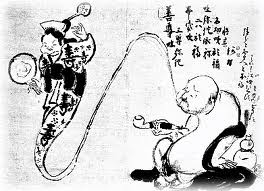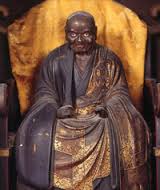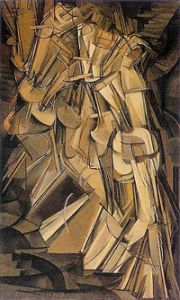Hakuin Zenji the great 18th century Japanese master, pipe dreams himself as an old woman former prostitute poet.
It is incumbent on us not to be married to the stories we tell ourselves.
That is not an excuse to think that nothing you think matters.
Of course, “matters” is relative and subjective, a product of mind.
But then, so is existence.
I have of late been concerned, as I bet you have, about the state of our nation and world. It is awesome in the sense of being overwhelming. Stunning in the sense of of being hit in the gut and having your breath knocked out.
What level of greed and delusion is our species capable of?
Look around.
A wall in Berlin
I was speaking to a friend of mine who is a professor of history. We don’t only learn from history in the sense of studying events that have occurred long enough ago to somehow be at a sufficient distance that they are described in summary form in textbooks and can be “processed,” that is, to have developed a coherent story about the events that relates to our world view (the big stories we tell ourselves). Events aren’t made into history after some respectable time has elapsed. Everything you experience is history. The “now” is too fleeting to grasp. Science teaches us that energy must reach us, cause changes in energy states in our sense organs, change the membrane states in the nerves that feed our brain, then our brains must sort the data about these energy transformations and decide how it relates to your stories and experience; all in time and space.
So, your “now” is a result of transformations that happened in the past.
It’s all history.
In my personal life I have sought liberation by pursuing my practice. More and more I appreciate the wisdom of Lily Tomlin’s statement that forgiveness is not wishing for a better past. That is true when seeking to forgive others and to forgive your self. That is especially true when you consider that to the extent you perceive, think, feel, and conclude anything about anything, you are experiencing the past.
I admit it. I find that I often wish for a better past. A past where delusion, ideology, racism and greed didn’t run our country and many other countries around the world. Personally, there are times I wish I zigged instead of zagged in my life. There are times I wish those near and dear to me zigged when I hoped they would, when it would have fit my image of the way things should be, when my ego would have been more supported, but they found zagging to be what they needed to do.
But wishing is delusion, it ends up causing more pain and suffering. It is an attempt to reify our stories, what we think we need instead of want, our conditioning, our egos.
We get disappointed when reality doesn’t fit our model of it, our stories, our wishes for a better past. As Stephen Gaskin said over 45 years ago, you have to appoint to be disappointed.
Of course, this can devolve into just more concepts, an excuse to give up, to not care. In Zen we say don’t pick or choose. Well, be careful about how you parse words and concepts. Compassion is at the base of Buddhism, of any religion or philosophy or world-view that isn’t just a way to rationalize greed and delusion. We may not want to be slave to our egotistical, conditioned picking and choosing, but we discriminate a rock from a potato, a kitten from a cobra, compassion from greed.
Hakuin Zenji not deceiving himself and occupying the ground he sits on
In Zen we say start where you are. Occupy the ground you stand on. Maezumi Roshi stressed no self-deception. Easy to agree with; what else would make any sense? Actually doing it, I find, is not so easy. How often do we like where we find ourselves? It isn’t always pretty, is it? But what else is there? Where else can you start, and what other strategy but no self-deception would possibly matter (see above)?
In the past few months I haven’t been too interested in math and science, other than as a professional medical scientist. Seemed a distraction. I have enjoyed taking a bit of a philosophical/metaphysical turn (in the sense of philosophizing about the implications of science) reading, for example, Bernardo Kastrup. Then last week I was talking about the coolness of quantum mechanics talking to a friend at the Zen center who has a strong math background, and I found myself fired up, going back to review some math and science and loving it; so pure, so elegant, so inherently not greedy, insane and devious.
Dogen said to study Buddhism is to forget the self. At least when delving into how an abstract logical construct like linear algebra ends up being a way to describe quantum phenomenon, I can, for a bit, forget myself. OK, that’s not totally true, and it certainly isn’t what Dogen was really saying. He said body and mind fall away, and mine hasn’t, not even when absorbed in new material. But still, it seems to at least give me a little break from all of the noise.
I like that you can’t cheat it without, well, cheating, and what’s the point of that? And it can get deeper as you return to it. You might have a certain understanding of a mathematical operation, but seeing how it works in another context, say linear algebra in quantum mechanics, brings you deeper; very cool.
Myths and stories can do that too, and I do like creative writing and have been doing some of that as well. I read somewhere you might as well do art; worse that can happen is it sucks, then you toss it. I like that. Nice if it doesn’t suck though, but hey, gotta start somewhere.
Of course, the ultimate art, the great performance piece, is our lives and our deaths.
Keep on dancing!










I was good at math–easy “A’s” in school until I got to Analytical Geometry and Calculus–then it’s off to Mars. Mars isn’t really that far, though. We have a few rovers up there collecting soil samples. So, maybe it’s off to some black hole somewhere, where there is no time and space, thus no history. That’s why I gave up on math. Well, maybe not entirely. I do count out change when I use real money–but mostly I use a debit card to pay my debts. Sometimes debts are forgiven and you don’t have to pay. I like when that happens. That’s when compassion is at its best. As overwhelming as it is, I’m here, now, being silly.
silly away my friend; we all can use some of that. But sometime consider math again. When not taking tests or trying to meet goals and expectations, it’s kinda fun. Or not.